Our Team
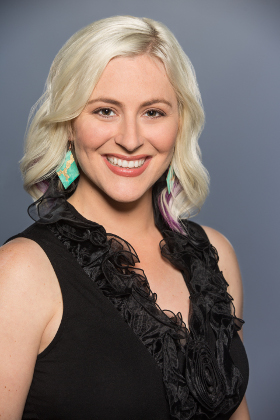
Laura M. Tully, PhD
Principal Investigator
Assistant Professor of Psychiatry, University of California, Davis
Director of Clinical Training at the UC Davis Early Psychosis Program (EDAPT and SacEDAPT clinics)
As the Director of Clinical Training for the UC Davis Early Psychosis Programs, Dr. Laura Tully provides instruction in evidence-based treatment and assessment approaches for youth experiencing psychosis, with an emphasis on CBT for psychosis in the context of the Coordinated Specialty Care model.
Dr. Tully's research uses neuroimaging (fMRI) and experience sampling techniques to examine how the neural and behavioral mechanisms of cognitive control and emotion regulation relate to response to social stress in individuals experiencing psychosis. Her research also includes the use of smartphone technologies, such as mobile health applications, as add-on tools for symptom management and treatment in early psychosis care. In particular, Dr. Tully is interested in how to improve cognitive control and emotion regulation skills using mobile health technology to reduce symptom exacerbations and improve functioning.
Dr. Tully earned her master’s degree from the University of Edinburgh in 2007 and her PhD in clinical psychology from Harvard University in 2013.

Mattie Fritz
Undergraduate research assistant
Mattie Fritz is a Biological Science major and Psychology minor at UC Davis, and she joined the PEP Lab in January 2019. She is a member of the UC Davis Honors Program, and she is doing her honors thesis research in the PEP Lab, focusing on collecting pilot data for a novel reward learning task using the socialStim videos. Mattie is particularly interested in the health sciences and research concerning psychological health and wellbeing. She finds emotion processing and regulation in individuals with psychotic disorders an engaging research topic and feels lucky to work in a lab that allows her to explore and refine her interests. Her favorite part of working in the PEP Lab is the close-knit community that encourages her to learn new skills every day. She hopes to use the skills and knowledge she is gaining in the PEP Lab to guide her graduate studies in the future.
Along with her membership in the UC Davis Honors Program, Mattie enjoys helping her sorority achieve academic success as Chi Omega's Vice President and head of scholarship, and is a member of the Greek Honors society Order of Omega. When Mattie isn’t studying or in the PEP Lab, she loves to dance with UC Davis’s urban dance team MK Modern. She is also an avid painter and baker.
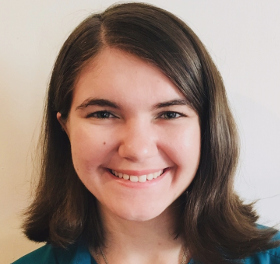
Shannon Lamb
Undergraduate research assistant
Shannon Lamb is majoring in Biomedical Engineering and minoring in Neuroscience at UC Davis. She joined the PEP Lab in January 2019 and is so excited to be gaining experience with psychiatric neuroscience. Shannon’s goal is to combine the fields of biomedical engineering and neuroscience to develop specific imaging instruments and techniques to help better prescribe medications to those suffering from mental illnesses, such as schizophrenia, bipolar disorder, and depression. The PEP Lab allows her to explore current imaging techniques, lead a personal research project, and help advance scientific understanding of the effects of schizophrenia. The PEP Lab’s inclusive environment provides the perfect setting for advancements in scientific inquiry and personal knowledge, and she feels very lucky to have the opportunity to join the team.
When Shannon is not at the PEP Lab, she competes in engineering competitions around campus, and is conducting a research project on a new form of chemistry education. She is a member of several clubs on campus, including the Biomedical Engineering Society, the Aerospace and Mechanical Engineering Society, and the Institute of Electrical and Electronics Engineers. In her spare time, she enjoys working on graphic design projects with a cup of tea while listening to Broadway musical soundtracks.

Grace Yu
Undergraduate research assistant
Grace Yu is a Neurobiology, Physiology, and Behavior major at UC Davis. She joined the PEP Lab in November 2019 and is excited to study the neural mechanisms and pathways underlying psychiatric disorders with neuroimaging technologies such as MRI scanning and tDCS. Psychopathological disorders can have serious impacts on quality of life, and Grace hopes to contribute to treatment research as an undergraduate research assistant and help expand scientific knowledge in this field of study. As a student with career aspirations in the medical field, she hopes that her research experiences and knowledge gained from her time in the PEP Lab will help guide her future studies.
Outside of the PEP Lab, Grace loves to paint, play piano, and explore new cities with friends. She is also a member of the Phi Delta Epsilon pre-medical professional fraternity, and volunteers at the UC Davis Medical Center assisting nurses in an ICU ward.

Julenne Ng
Undergraduate research assistant
Julenne Ng is a Neurobiology, Physiology, and Behavior major at UC Davis. She joined the PEP Lab in November 2019 intending to explore her interest in neuroscience. She is particularly excited to learn more about emotion processing, emotion regulation, and cognitive control in individuals experiencing psychosis and other forms of psychopathology. As an undergraduate research assistant in the PEP Lab, Julenne is grateful for the opportunity to gain knowledge and skills in her field of interest and is looking forward to conducting her own independent research project in the future. She hopes that her experiences in the PEP Lab will guide her future studies in the medical field.
Outside of the PEP Lab, Julenne is passionate about fitness and wellness, and enjoys spending her time at the gym and experimenting with healthy recipes. She also loves discovering new music and exploring new food spots in her hometown of San Francisco.
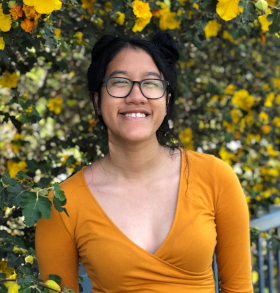
Narimes Parakul
Undergraduate research assistant
Narimes Parakul is a Cognitive Science major and Sociology minor at UC Davis. She joined the PEP Lab in March 2020 and is excited to learn more about the use of the fMRI neuroimaging technique and tDCS technology as tools to investigate emotional processing in psychosis patients. She is particularly interested in how atypical emotion processing may conduce psychopathology. She hopes to enter the field of psychiatry and contribute to the continuing fight to end mental illness stigma and provide mental health treatment and education for disenfranchised communities. Narimes strives to enter a graduate program in clinical psychology and is enthusiastic to apply the valuable skills and knowledge she is learning in the PEP Lab in her future graduate studies.
Alongside her primary research interests in psychopathology and social neuroscience, Narimes’ minor in sociology allows her to study systems of privilege, oppression, and institutionalized discrimination that influence perceptions of race, gender, sexual orientation, and class, as well as the psychological consequences of these systems. She is an advocate for social justice in science and beyond, and plans to incorporate values of inclusivity and equality in her future work as an academic and a social scientist.
Outside of the PEP Lab, Narimes enjoys spending time with her family, sitting on the UC Davis quad with her friends on a sunny day, and watching movies in her free time.

Tig
Tig is a very good dog who enjoys eating, sleeping, hunting squirrels, and sneaking around the PEP Lab on the weekends. He likes head scratches and is on a mission to protect his mom Dr. Tully from mysterious outside noises.
PEP Lab Collaborators

Bryn Ritter
Former undergraduate research assistant
Bryn Ritter’s research interests focus on comorbidities associated with schizophrenia, particularly substance use disorder and its resulting impacts on the diagnosis and treatment of psychosis. While working in the PEP Lab as an undergraduate research assistant, Bryn conducted an independent research project exploring hypotheses related to psychosis and cannabis use disorder. She has since joined the research staff at the UC Davis MIND Institute studying chromosome 22q11.2 deletion in children with neurodevelopmental disorders, and she continues to collaborate with the PEP Lab to investigate comorbid psychosis and cannabis use disorder.
Bryn graduated from UC Davis in 2019 with a bachelor’s degree in Neurobiology, Physiology, and Behavior and a minor in Chemistry. While at UC Davis, she was a member of the UC Davis Honors Program and a recipient of the UC Davis Regents Scholarship. Bryn aspires to become a physician and hopes to attend medical school in the future.
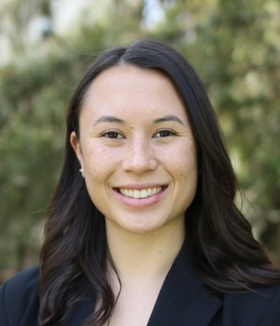
Grace Lara
Former undergraduate research assistant
Grace Lara is interested in better understanding the neural and behavioral mechanisms underlying psychopathologies such as schizophrenia, and in developing novel treatment for existing psychiatric conditions with the goal of improving patients’ future outcomes. As an undergraduate research assistant in the PEP Lab, she spearheaded a project to investigate the effects of menstrual cycle phase on task performance in the Cognitive Control of Emotion study. After graduating from UC Davis, she returned to the Imaging Research Center as a full-time Junior Specialist with a CNTRACS project, which is seeking to validate cognitive tasks for individuals experiencing serious mental illness. Grace continues to collaborate with the PEP Lab to study the effects of menstrual cycle phase on emotion regulation.
Grace graduated from UC Davis in 2019 with a bachelor’s degree in Neurobiology, Physiology, and Behavior. While at UC Davis, she served as a Clinic Intern and Wellness Coordinator at the Bayanihan student-run clinic, where she helped provide health services to underserved communities in Sacramento. Grace hopes to become a medical doctor in the future. When she’s not doing science, Grace is an avid runner, loves soccer, and spends any time she can hiking and exploring California's state parks.
PEP Lab Alumni
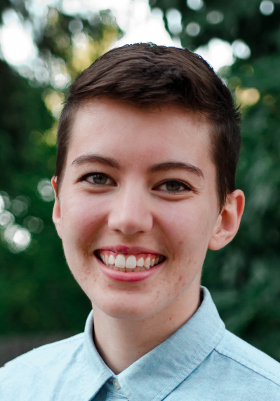
Mary Blendermann
Former lab manager
Mary Blendermann worked as the PEP lab manager from July 2018 to July 2020. During her time in the lab, she recruited participants and collected data for the Cognitive Control of Emotion and tDCS and Emotion Processing studies, including structured clinical assessments, tDCS sessions, and fMRI scans, for which she operated a 3T Siemens Tim Trio MRI scanner. She cleaned and analyzed behavioral and neuroimaging data from these projects using MATLAB, SPM12, and the HCP Minimal Processing Pipeline, which she adapted using bash shell scripting, FSL, and FreeSurfer. Mary also oversaw stimuli editing and data collection for the socialStim project, wrote MATLAB scripts that prepared over 125,000 rows of norming and reliability data for analysis, and contributed to various posters and publications in the PEP Lab and in collaboration with the UC Davis TCAN Lab.
Mary utilized data from the Cognitive Control of Emotion study to conduct an independent research project on the relationship between traumatic experiences and cognitive control of emotion in individuals with schizophrenia. She presented this work as a first-author poster at the 2019 Annual Meeting of the Society for Research in Psychopathology.
Mary graduated summa cum laude from Hillsdale College in 2018 with a bachelor's degree in psychology and departmental honors. In fall 2020, she will be joining the doctoral program in clinical psychology at the University of Pittsburgh, where she will be studying cognitive control and perseverative thought under the mentorship of Dr. Lauren Hallion in the Cognitive and Neural Mechanisms of Anxiety (CNMA) Lab. Mary hopes to become an academic clinical psychologist, and to continue studying the regulation of emotion and attention in clinical populations.

Lauren Zakskorn
Former lab manager
LinkedIn: linkedin.com/in/lauren-zakskorn
Lauren started working in the PEP Lab in January 2016 coordinating two new studies, as well as managing a team of undergraduate volunteers. In first study, the SocialStim, which aims to create a database of diverse video and picture stimuli to assess negative social evaluation, she filmed 53 actors, edited over 3,000 video clips and pictures using Final Cut Pro X and Audacity, collected approximately 300,000 ratings for norming the data using platforms like SONA Study Systems and Amazon Mechanical Turk, and analyzed the dataset using JMP (SAS).
In the second and concurrent study, the Cognitive Control of Emotion (CCoE) Study, which investigates the underlying neural mechanisms in explicit and implicit emotion processing in healthy controls and patients with recent onset schizophrenia, she recruited over 50 participants, managed the IRB paperwork, collected data by conducting clinical interviews with gold-standard measures like the Structured Clinical Interview for DSM-5 and fMRI scans in a 3T Tim Trio MRI scanner which she operated, wrote scripts in MATLAB to analyze behavioral and fMRI data, and contributed to publications.
Lauren is interested in understanding the human mind by studying deficits in neural mechanisms in a clinical setting. She presented a first author poster at the Society for Research in Psychopathology annual meeting in 2017 titled "Sex differences in reactivity to and regulation of negative social evaluation in healthy individuals and individuals with psychosis."
Lauren was accepted to the University of California at Berkeley Post-Baccalaureate Health Professions Program. She hopes to study medicine and specialize in either psychiatry or neurology to ultimately attain an academic physician position, where she can provide clinical populations with neuropsychiatric care and be inspired to conduct neuroscience research to address gaps in knowledge and to improve treatment.

Anna Moody
Former undergraduate research assistant
LinkedIn: linkedin.com/in/akmoody/
Anna Moody joined the PEP Lab as an undergraduate research assistant in January 2018. Along with assisting with data collection and auditing for the Cognitive Control of Emotion and tDCS and Emotion Processing studies, she led an effort to collect test-retest reliability data for the socialStim videos using the SONA research participation system on the UC Davis campus. This project included creating Qualtrics surveys, training other volunteers to independently run testing sessions, and managing data as it was collected. Anna also generated a concept for an independent research project to investigate whether exercising cognitive control could help mitigate the impact of implicit and explicit racial biases during social interactions.
Anna graduated from UC Davis in 2019 with a bachelor’s degree in biopsychology and is pursuing a career in mental healthcare in her hometown of Los Angeles. Outside of work, she enjoys surfing and taking her Border Collie puppy to the dog beach.

Raisa Rahim
Former undergraduate research assistant
Raisa is interested in how facial expressions serve as indicators of an interaction partner's emotional state, in turn giving the perceiver cues for how to interact with them. She wants to gain experience with functional MRI so that she can explore related questions in graduate school. Being in the PEP lab is a great place to get hands-on research experience by working independently and with others!
Raisa published a literature review in UC Davis's journal, Explorations.
Raisa was accepted to UC Davis's Neuroscience program to start in Fall 2018. She also received a National Science Foundation Graduate Research Fellowship to support her graduate school aspirations.

Gabriella Hamlett
Former undergraduate research assistant
Gabriella Hamlett joined the PEP lab in January 2018. Volunteering in the PEP lab has been an integral experience in developing her research interests. She has enjoyed processing data, contributing to writing and editing research papers, conducting literature reviews, and observing and monitoring clinical and fMRI scanning appointments, respectively. Her experience at the PEP Lab has affirmed her dream of pursuing a PhD in Clinical Psychology. She is interested in studying adaptive and maladaptive emotion regulation among individuals with psychotic disorders and hopes to continue to do so in her future academic endeavors.
Gabriella graduated from the University of California, Davis in 2017 with a B.S. in psychology and a minor in writing. In the fall, Gabriella will be starting a Master’s degree program in clinical psychology at Columbia University, with a merit-based scholarship, to further prepare for pursuing her PhD in Clinical Psychology.